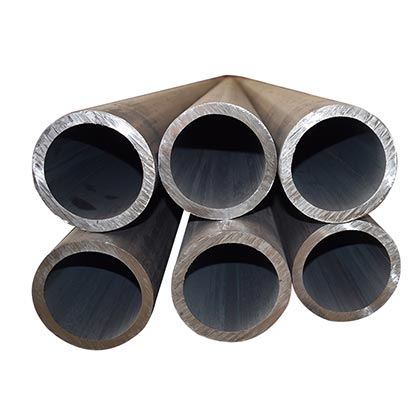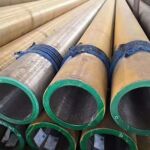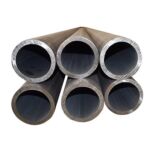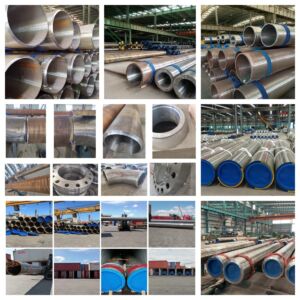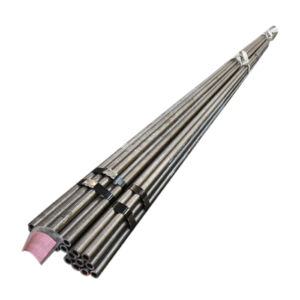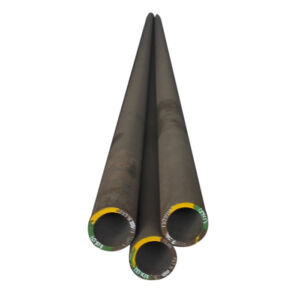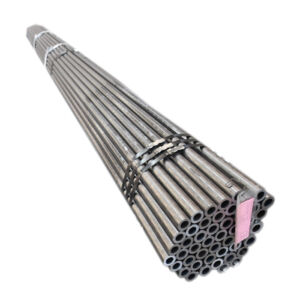GB 5310 20MnG High Pressure Boiler Tubes
Standard:GB 5310 Seamless steel tubes and pipes for high pressure boiler
GB 5310 standard is applicable to steam boilers and pipeline seamless pipes for the manufacture of high pressure and above.
GB 5310 20MnG High Pressure Boiler Tubes Quick Details
Manufacture:Seamless process ,Hot-finished or Cold-finished
Wall thickness(WT): 2.8 mm——150 mm.
Outer diameter (OD): 23 mm——1500 mm
Length: 6M or specified length as required.
Ends: Plain End, Beveled End, Treaded
Manufacturing methods
(1)Steel smelting method
GB 5310 20MnG steel will be smelted by electric furnace plus furnace refining, oxygen converter plus furnace refining or electroslag remelting method.
(2)Manufacturing methods and requirements for tube blanks
The tube blank can be produced by continuous casting, die casting or hot rolling (forging).
(3)Manufacturing method of steel tube
GB 5310 20MnG Steel tubes shall be manufactured by hot rolling (extrusion, expansion) or cold drawing (rolling).
Classification, code
a) Hot rolled steel pipe, codenamed WH;
b) Cold drawn steel pipe, codenamed WC.
Heat treatment for GB 5310 20MnG High Pressure Boiler Tubes
|
Grade |
Heat treatment |
| 20MnG |
880 ℃~940 ℃,Normalizing |
Chemical composition of GB 5310 20MnG High Pressure Boiler Tubes
|
Steel Pipe |
Chemical Composition(%) | ||||||||
| C | Si | Mn | Cr | Mo | V | Ni |
Cu |
P |
|
|
Max |
|||||||||
| 20MnG | 0.17~0.23 | 0.17~0.37 | 0.70~1.00 | ≤0.25 | ≤0.15 | ≤0.08 | ≤0.25 | ≤0.20 |
0.025 |
Mechanical properties of GB 5310 20MnG High Pressure Boiler Tubes
|
Steel Pipe |
Tensile properties |
Impact energy(Akv),J | Hardness | |||||||
|
Tensile strength |
Yield Strength (MPa) |
Elongation |
Portrait | Landscape |
A |
B | C | |||
| HBW | HV |
HRC |
||||||||
| Portrait | Landscape | |||||||||
|
Max |
Min |
|||||||||
|
20MnG |
≥415 | 240 | 22 | 20 | 40 | 27 | — | — |
— |
|
Allowable deviation of outer diameter and wall thickness
|
Type of steel pipe |
Outer diameter(mm) | Tolerance | |||
| ordinary |
advanced |
||||
|
Hot rolled tube |
OD | ≤50 | ±0.40 | ±0.30 | |
|
>50~≤325 |
WT≤35 | ±0.75% | ±0.5% | ||
| WT>35 | ±1% |
±0.75% |
|||
|
>325 |
±1% | ±0.75% | |||
|
WT |
≤4.0 |
±0.4 |
±0.3 |
||
| >4.0~≤20 | ±10% |
±7.5% |
|||
|
>20 |
OD<219 |
±10% |
±7.5% |
||
| OD≥219 | +12.5% -10% |
±10% |
|||
|
Cold drawn tube |
OD |
≤25.4 | ±0.15 | — |
|
>25.4~≤40 |
±0.20 | — | ||
|
>40~≤50 |
±0.25 | — | ||
|
>50~≤60 |
±0.30 |
— |
||
| >60 | ±0.5% |
— |
||
| WT | ≤2.8 | ±0.2 |
— |
|
| >2.8 | ±7.5% |
— |
Testings
(1)Hydraulic test
The steel pipe shall be hydraulically tested one by one, and the eddy current testing can instead of the hydraulic test.
(2)Flattening test
Steel pipes with an outer diameter greater than 22 mm to 400 mm and a wall thickness not greater than 40 mm shall be subjected to a flattening test.
(3)Bending test
Steel pipes with an outer diameter greater than 400 mm or a wall
(4)Flaring test
The steel pipe with an outer diameter of not more than 76 mm and a wall thickness of not more than 8 mm can be used for the flare test.
(5)Low-power test
Steel pipes should be tested at low magnification. Visually visible white spots, inclusions, subcutaneous bubbles, tumbling and delamination are not allowed on the cross-section acid immersion test piece.
(6) Non-metallic inclusions
Steel pipes shall be tested for non-metallic inclusions.
(7)grain size
The finished steel pipe should be tested for grain size.
(8)Microstructure
The finished GB 5310 20MnG steel pipe of high-quality carbon structural steel shall be ferrite plus pearlite, and no superheated structure shall be allowed;
(9)Decarburization layer
Cold drawn (rolled) finished steel pipes with an outer diameter of not more than 76 mm shall be inspected for the total decarburization layer.
(10)Non-destructive testing
The steel pipe shall be ultrasonically inspected and tested in accordance with the provisions of GB/T 5777.
Surface quality
The inner and outer surfaces of steel pipes do not have cracks, folds, crusting, rolling and separation. These defects shall be completely removed and the depth of defect removal shall not exceed 10% of the wall thickness. The actual outer diameter and wall thickness of the defect removal shall not be less than the minimum allowable for the outer diameter and wall thickness.
End shape
The end faces of the steel pipe should be perpendicular to the axis of the steel pipe, and the incision burrs swill be removed.




